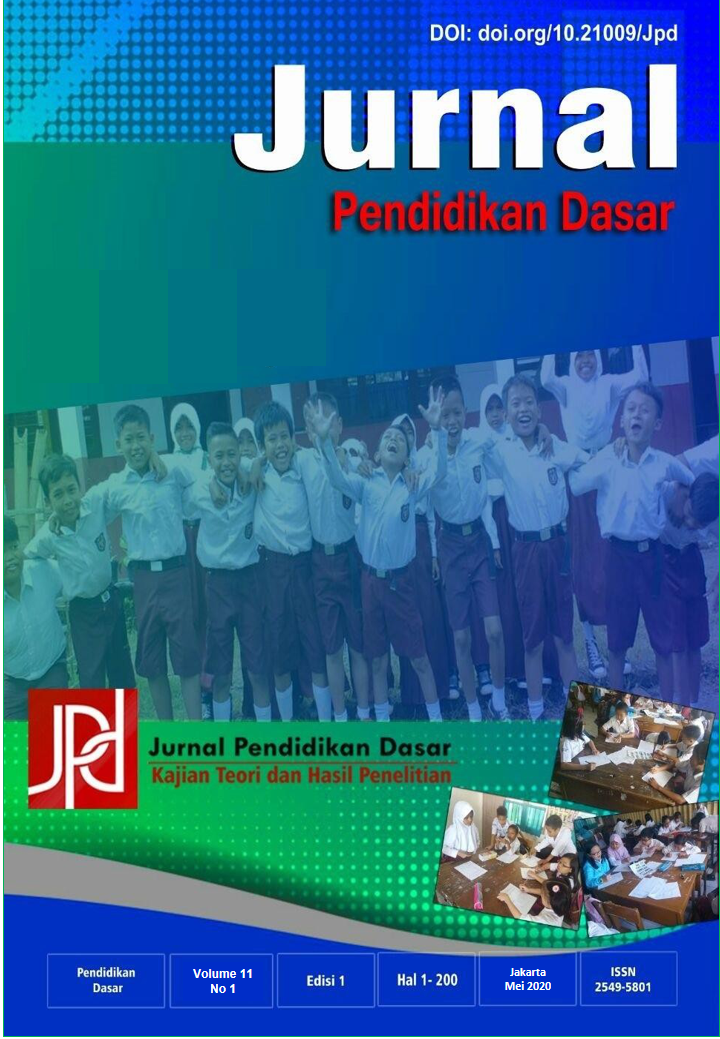PENDIDIKAN ABSTINENSI DALAM KURIKULUM PENDIDIKAN DASAR INDONESIA
DOI:
https://doi.org/10.21009/jpd.v11i1.15435Keywords:
abstinence, education, elementary schoolAbstract
Abstinence education for young students has not been widely applied in Indonesia. Other countries conducted various implementation, all of them agreed the importance of reproduction health, sexuality, and population studies for the community, notably adolescent. The study aims to compare the application of abstinence education in some countries through literature review. As many as 31 articles regarding abstinence and abstinence education reviewed as well as core competences and basic competences in Curricullum-2013 for elementary education. Some of the articles claimed that abstinence-only education had nothing to do with the decrease of teenage/premarital pregnancy. Others proved that abstinence education with specific materials/topics relevant with culture and values have some effect on knowledge and responsible behaviour. However, parents and teachers still had many challenges and barriers in delivering the topics and using the media. Policy implementation urged and needed now are identification of education materials, the use of media, and development of teacher’s guide book.
References
BPS, BKKBN, Kemenkes, & USAID. (2017). Survei Demografi dan Kesehatan Indonesia 2017 Kesehatan Reproduksi Remaja. Survei Demografi Dan Kesehatan Indonesia, 28(12), 1407–1408. https://doi.org/10.1016/B978-0-12-804024-9/00048-3
Buhi, E. R., Goodson, P., Neilands, T. B., & Blunt, H. (2011). Adolescent sexual abstinence: A test of an integrative theoretical framework. Health Education and Behavior, 38(1), 63–79. https://doi.org/10.1177/1090198110375036
Center for Population Research and Development, B.-N. P. and, & Family Planning Board, I. (2018). INDONESIA DEMOGRAPHIC AND HEALTH SURVEY 2017: ADOLESCENT REPRODUCTIVE HEALTH KEY INDICATORS REPORT.
Clark, M., Lewis, A., Bradshaw, S., & Bradbury-jones, C. (2018). How public health nurses ’ deal with sexting among young people : a qualitative inquiry using the critical incident technique, 1–11.
Dawson, R. S. (2018). Adolescent Sexual Health and Education : Where Does the Pediatrician ’ s Responsibility Fall ? PEDIATRIC ANNALS, 47 no 4. https://doi.org/10.3928/19382359-20180321-01
Doubova, S. V., Martinez-Vega, I. P., Infante-Castaneda, C., & Perez-Cuevas, R. (2017). Effects of an internet-based educational intervention to prevent high-risk sexual behavior in Mexican adolescents. Health Education Research, 32(6), 487–498. https://doi.org/10.1093/her/cyx074
Ecoinvent. (n.d.). What is, 1(3), 1–6. https://doi.org/10.2307/2065457
Goodson, Patricia;Suther, Sandy;Pruitt, B E;Wilson, K. (2003). Defining abstinence : Views of directors , instructors , and ... The Journal of School Health, 73, 3(mar 2003), 91.
Kabiru, C. W., & Ezeh, A. (2007). Factors Associated with Sexual Abstinence among Adolescents in Four Sub-Saharan African Countries. African Journal of Reproductive Health, 11(3), 111. https://doi.org/10.2307/25549735
Kathrin F. Stanger-Hall, D. W. H. (2011). Abstinence-Only Education and Teen Pregnancy Rates: Why We Need Comprehensive Sex Education in the U.S. PLoS ONE, 6 (10)(october 14, 2011), 201–208. https://doi.org/10.1371/journal.pone.0024658
Kusheta, S., Bancha, B., Habtu, Y., Helamo, D., & Yohannes, S. (2019). Adolescent-parent communication on sexual and reproductive health issues and its factors among secondary and preparatory school students in Hadiya Zone , Southern Ethiopia : institution based cross sectional study. BMC Pediatric, 19:9(January, 07 2019), 1–12.
Lohan, M., Aventin, Á., Clarke, M., Curran, R. M., Maguire, L., Hunter, R., … O’Hare, L. (2018). JACK trial protocol: A phase III multicentre cluster randomised controlled trial of a school-based relationship and sexuality education intervention focusing on young male perspectives. BMJ Open, 8(7). https://doi.org/10.1136/bmjopen-2018-022128
Masters, N. T., Beadnell, B. A., Morrison, D. M., Hoppe, M. J., & Gillmore, M. R. (2008). The Opposite of Sex? Adolescents’ Thoughts About Abstinence and Sex, and Their Sexual Behavior. Perspectives on Sexual and Reproductive Health, 40(2), 87–93. https://doi.org/10.1363/4008708
Menon, J. A., Kusanthan, T., Mwaba, S., & Juanola, K. (2018). ‘ Ring ’ your future , without changing diaper – Can preventing teenage pregnancy address child marriage in Zambia ? Public Library of Science, (October 22, 2018), 1–18. https://doi.org/10.1371/journal.pone.0205523
Nurfadhilah. (2019). ANALISIS PENDIDIKAN KARAKTER DALAM MEMPERSIAPKAN PUBERTAS MENUJU GENERASI EMAS INDONESIA 2045. JPD: Jurnal Pendidikan Dasar, 10(31-05–2019), 85–100. https://doi.org/10.21009/JPD.010.09
Nurfadhilah, & Ariasih, A. R. (2019). Abstinensi dan Pendidikan Seks Remaja: Survei Cepat di Jakarta dan Sekitarnya. Pendidikan Lingkungan Dan Pembangunan Berkelanjutan, XX(Maret 2019), 17–28.
Pinandari, A. W., Wilopo, S. A., & Ismail, D. (2015). Pendidikan Kesehatan Reproduksi Formal dan Hubungan Seksual Pranikah Remaja Indonesia. Kesmas: National Public Health Journal, 10(1), 44. https://doi.org/10.21109/kesmas.v10i1.817
Santelli, J. S., Grilo, S. A., Choo, T., Diaz, G., Walsh, K., Wall, M., … Mellins, C. A. (2018). Does sex education before college protect students from sexual assault in college ?, 1–19. https://doi.org/10.1371/journal.pone.0205951
Sari, R. (2017). Peran Orang Tua dalam Mendidik Anak pada Masa Pubertas di Desa Pulo Kambing Kecamatan Kluet Utara Aceh Selatan.
Smith, T. E., Panisch, L. S., Malespin, T., & Graça Pereira, M. (2017). Evaluating effectiveness of abstinence education. Journal of Evidence-Informed Social Work, 14(5), 360–367. https://doi.org/10.1080/23761407.2017.1340860
Tabong, P. T., Maya, E. T., Adda-balinia, T., Kusi-appouh, D., Birungi, H., Tabsoba, P., & Adongo, P. B. (2018). Acceptability and stakeholders perspectives on feasibility of using trained psychologists and health workers to deliver school-based sexual and reproductive health services to adolescents in urban Accra , Ghana, 1–17.
Utomo, E., Nurfadhilah, Hidayat, O. S., Wicaksono, J. W., & Arif, A. (2019). The Misconception of Teacher ’ s and Student ’ s Knowledge Regarding Puberty in Higher Elementary Education.
Downloads
Published
How to Cite
Issue
Section
License
Jurnal Pendidikan Dasar





















